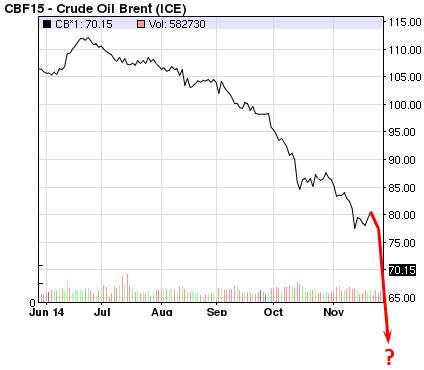OPEC finished up its winter meeting yesterday and decided not to cut oil production. This came as a surprise to those who still think of OPEC as the maniacal oil hawks who roiled global petroleum markets in the 70s, but less so to those who know that cartels are notoriously difficult to hold together—especially when it’s a leaky cartel that’s missing  some key producers. In any case, OPEC members couldn’t agree on just who would pay the price of cutting production, and the Saudis, for reasons still unclear, were unwilling to shoulder the burden themselves this time around. So OPEC oil production will remain unchanged.
some key producers. In any case, OPEC members couldn’t agree on just who would pay the price of cutting production, and the Saudis, for reasons still unclear, were unwilling to shoulder the burden themselves this time around. So OPEC oil production will remain unchanged.
The result? After six months of declining oil prices, we suddenly got plunging oil prices. Why? Not so much because of the shale oil revolution in the US. For all the attention it gets, fracking has increased global oil production by only a few percent and would normally have only a moderate effect on prices. Unfortunately, these aren’t normal times: in addition to a small increase in the oil supply, the global economic slowdown has depressed demand. That’s a bigger factor than fracking, and with European and Asian economies looking increasingly fragile, not one that seems likely to be corrected anytime soon.
How low will oil go? No one knows. When will it turn up again? Probably not until the global economy starts to grow at a decent pace. And no one knows when that will happen either.
For more, check out Brad Plumer, who has a much more detailed explanation of the both the politics and the economics of the oil scene here.

















